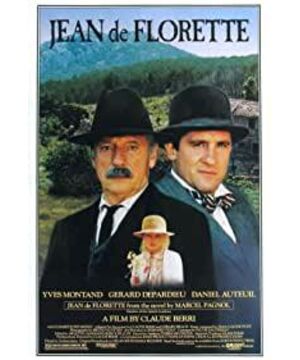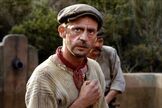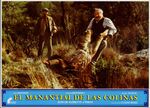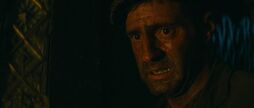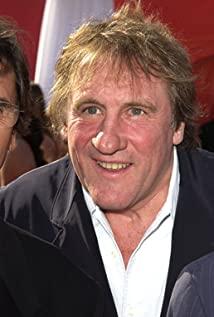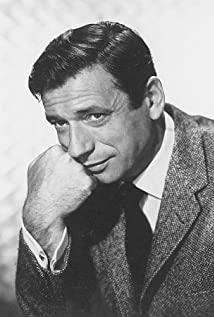early eighteenth century, teenager Marshall Pagnol hear the story of a home, in 1952 he changed the story into a movie script and shooting, its heroine is the wife, more than a dozen Years later, he added a prequel to it and wrote a two-volume literary masterpiece. More than ten years after the author's death in 1985, director Claude Berri recruited three celebrities to re-shoot the two films together, which won a lot of awards. That is, there is a movie, a masterpiece, and a big movie before and after, all based on the same story, and they are all classics.
I, at the end of 2010, the ghosts and gods first found the first half of the movie behind, and after watching it, I didn’t forget it. Before returning home for the holidays, I grabbed a French booklet of Jean de Florette (also known as "Love in the Mountain") in the French League library, and of course I couldn't understand it. After returning the book a year later, feeling regretful, he resolutely seized the translated version of "Mountain Spring". One afternoon two weeks later, I immersed myself in the second half of the book (that is, the second half of Mannon des sources "Spring Water Manon" which I haven't seen a movie, and I don't know the festival). In the evening, I quickly found out the movie version of "Ganquan Manon" to make up the lesson. In other words, I watched the two movies in 1985 and the two-volume Chinese translation of the original author's novel, but I have never watched the original old film of Pagnol.
The most touching is the movie "Love in the Mountain City" and the text of "Spring Manon". That is to say, the form that each story originally presented on my side is the most powerful.
This version of the translation is of high quality, fluent in place and literary. Li Yumin’s reputation is obviously not as great as Zhou Kexi and Hao Yun for a fan of French literature like me, mainly because his works are mostly modern. I Rarely dabbled. But this time I am proud of the quality of the French translation.
"Spring Manon" is the second half of the work. It is actually the core of the story. I watched it effortlessly from beginning to end, and I couldn't help crying in two or three places. Manon wandered around the "wood statue" tree that his father loved all day, and bowed to the big tree like his father. Manon had no intention of overhearing the truth of the matter, and ran to the crooked neck tree in anger and sadness, crying—descriptively. It’s just that she was crying, but I kept showing up like a kind and gentle hunchback; my father finally learned the true identity of Manon and the hunchback—all the remorse that turned over the river was not described, only he was old all night. , That letter, and Manon recalled the weird behavior afterwards, but because we knew the hidden secrets, we felt deeply sympathetic and sorrowful. In addition, Yu Gelan was chatting with Mr. Humpback's soul to Haoyue in the flower garden every night, and this scene was really moving. And Manon was described by Yu Golan as "like a locust jumping around in the mountains all day", which turned me over.
The Chinese translation of "Lian Lian Shan Cheng" is really timeless and appropriate. The Manon in the movie is not as wild and beautiful as I imagined with vivid depiction and smooth translation. However, the acting in the 1980s is usually close to making people think " "Stupefied as a wooden chicken" shape to show all the inner drama. Of course, except for the three great movie kings here. Watching old movies actually seldom resonates, especially the classically constructed literary movies, but like Gerard Depardieu, it is enough to penetrate all barriers with personal charm and reach my heart. His eyes were so bright in his youth, and the hunchback on him has become a beautiful flaw that makes him more real. Other people's terrible-sounding dialect French immediately became melodious when he spoke it out of his mouth. He was really a figure in the upper body of the drama, with charming body language, voice, and expressions, as well as passionate and sincere. The life-saving dark clouds gathered, but drifted away when he was in ecstasy, leaving two drops of rain on his face. He has always been active and eager and finally roared to the sky: "I am a hunchback! I am a hunchback! Heaven! Isn't there a person!"
In addition, Yves Montan's tension is only revealed in the lower half, and the last stage of the penance performance can only be supported by the drama. And Daniel Otto is just like jumping out of the book-"Child, you can't hate him because he is ugly." With his wretched and cunning eyes, he is afraid of the good luck of others, dealing with gentlemen in the city. Confusion and surprise, the vague sense of guilt remaining in my heart when doing evil, and the Ah-Q-style self-deception, are really vivid, high-five and amazing.
Speaking of how blessed a story is in order to get such a comprehensive, thorough and classic elaboration. In other words, how much confidence and brilliance can a story that can withstand such all-round adaptation, creation, description, narration, and performance be. Not to mention the sinister human heart, the true nature of humanity, and the creation of people. The pure and foolish Provence countrymen and scenery are enough to keep the legend of thousands of times lingering in the heart for a long time.
View more about Jean de Florette reviews


